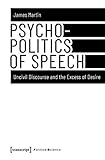Psychopolitics of speech : uncivil discourse and the excess of desire / James Martin.
Material type: TextSeries: Publication details: Bielefeld : Transcipt Verlag, (c)2019.Description: 1 online resource (186 pages)Content type:
TextSeries: Publication details: Bielefeld : Transcipt Verlag, (c)2019.Description: 1 online resource (186 pages)Content type: - text
- computer
- online resource
- 3839439191
- 9783839439197
- BF173 .P793 2019
- COPYRIGHT NOT covered - Click this link to request copyright permission: https://lib.ciu.edu/copyright-request-form
| Item type | Current library | Collection | Call number | URL | Status | Date due | Barcode | |
|---|---|---|---|---|---|---|---|---|
 Online Book (LOGIN USING YOUR MY CIU LOGIN AND PASSWORD)
Online Book (LOGIN USING YOUR MY CIU LOGIN AND PASSWORD)
|
G. Allen Fleece Library ONLINE | Non-fiction | BF173 (Browse shelf(Opens below)) | Link to resource | Available | on1099946549 |
Browsing G. Allen Fleece Library shelves, Shelving location: ONLINE, Collection: Non-fiction Close shelf browser (Hides shelf browser)
Includes bibliographies and index.
Preface -- Introduction -- 1. Bodies of speech -- 2. Voicing desire -- 3. Talking to excess -- 4. The force of the bitter argument -- 5. An ethics of speech? -- Conclusion -- Bibliography.
The human capacity for speech is forever celebrated as evidence of its innate civility. Why, then, is public discourse often - and today more than ever, it would seem - so uncivil, even delusional? The reason, argues James Martin in this timely book, lies in the way speech works to organise desire. More than knowledge or rational interests, public speech services an unconscious urge for a lost enjoyment, stimulating an excess in subjectivity that moves us in body and mind. Martin draws upon the work of psychoanalyst Jacques Lacan as well as other Continental thinkers to set out a new approach to the analysis of rhetoric and answer the troubling question of whether civil discourse can ever hope to escape its obscene underside.
COPYRIGHT NOT covered - Click this link to request copyright permission:
There are no comments on this title.







